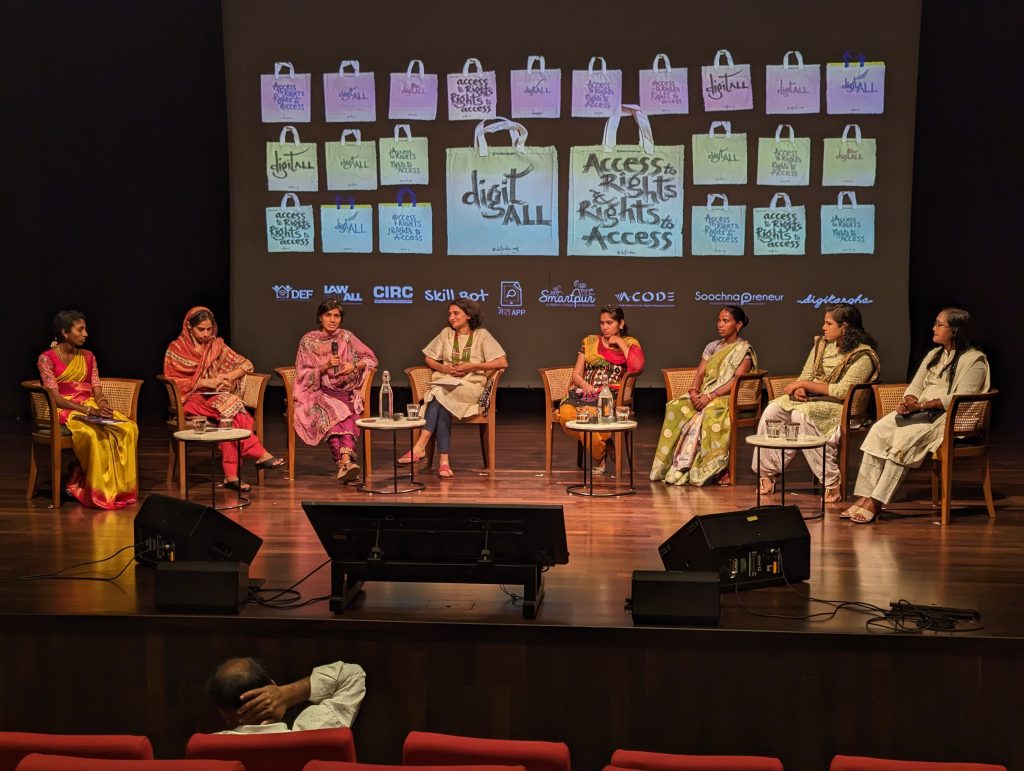digitALL: Access to Right & Rights to Access

The Law for All Initiative at Ashoka successfully hosted the “digitALL: Access to Rights & Rights to Access” event on May 4, 2023, at the Bangalore International Center (BIC) in Domlur, Indiranagar. This event marked the celebration of 20 years of the Digital Empowerment Foundation’s (DEF) impactful work in bringing digital access and empowerment to marginalised communities in India.
The event began with an introduction by Aamir Ullah Khan, a renowned economist and a board member of DEF, who contextualised the digital divide and emphasised the need for digital intervention, especially during the COVID-19 pandemic, where unequal access to healthcare and education became apparent.
The panel discussion on “Access to Rights and Rights to Access” was moderated by Shubashish, the Director of the Law for All Initiative at Ashoka. The panellists included Osama Manzar, founder of DEF, Ashwini Kulkarni from Pragati Abhigyan, Mohit Raj from Second Chance, and Nikita Sonavane from the Criminal Justice and Police Accountability Project.
Responding to the questions on policy advocacy, Osama Manzar shared how it organically originated from DEF’s initial intervention, which eventually led to the shaping of policies such as the Common Service Centres and the National Digital Literacy Mission. Osama also highlighted his advocacy against Mark Zuckerberg’s Free Basics initiative after initially collaborating with him.
Nikita Sonawane, representing a group of lawyers, discussed their efforts to address the overrepresentation of Scheduled Castes (SC) and Scheduled Tribes (ST) in prisons and police stations. Their work aimed to understand the routine criminalisation of denotified tribes and the everyday oppression marginalised communities face. They collected data on arrests, complaints, and petty offences cases, highlighting the need to challenge the criminalisation of livelihoods and caste-based discrimination.
Mohit Raj, the founder of Second Chance, emphasised the organic nature of policy advocacy in their work too. He focused on their work on prisoner and prison reform and how they started it with fellows who had experienced the system firsthand. Mohit explained how they integrated digital solutions, such as digitising the Mulakat system for family visits to prisons, and advocated for the timely release of prisoners convicted of non-heinous crimes.
Ashwini Kulkarni discussed the challenges of accessing entitlements and emphasised the importance of making benefits easily accessible to marginalised communities. She highlighted the need to improve the implementation machinery and make the delivery mechanisms more efficient.
Looking toward the future, Ashwini emphasised the imperative of minimising the struggles marginalised individuals face in accessing entitlements. Mohit envisaged a prison system guided by leaders and activists who have experienced the hardships firsthand, defying the traditional prison industrial complex model. Nikita spoke about equitable resource access and the assertion of community rights as pivotal solutions to combat criminalisation.
In a conversation that resonated with the audience with anecdotes and insights, renowned journalist Priya Ramani engaged in an enlightening dialogue with Osama Manzar, exploring his remarkable journey and its powerful convergence with DEF’s transformative mission.
In the later part of the event, Natasha Badhwar, a noted journalist, author, and filmmaker, curated conversations with inspiring women digital changemakers from different regions of India.
Natasha conversed with Babita, Mani Bharati, Harshita, Atayya, Oliva, and Kiran, who are leading DEF’s initiatives on the ground. They shared their experiences using digital tools to empower communities, access government schemes, and provide education and employment opportunities. They also shared their struggle with patriarchy in leaving the domestic sphere and working in public and their victory that passes on the energy to their younger generation in the community.
The event culminated in a mesmerising cultural performance by Vasu Dixit and a poetry recitation by Nitesh Bhardwaj adding artistic flair to the already vibrant atmosphere. Participants were then treated to a delightful dinner and networking session, creating an opportune platform for connections and potential collaborations among like-minded individuals
